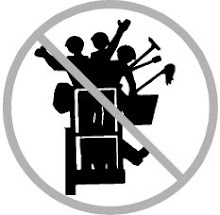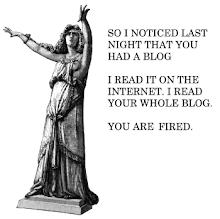An old post from my other blog that I felt was fitting:
It's come to my attention in my many years of theatre that most performers (and many directors) aren't very well-versed in technical theatre. Which is fine. No, actually, it's not really. I've seen many an argument between lighting designer and choreographer, stage manager and actor, et cetera et cetera. In almost every instance, the argument never would have begun if the non-technician could take the time to learn some basics rules:
1. The fast/good/cheap rule. You can have something fast and good, but it won't be cheap. It can be cheap and fast, but it won't be good. It can be cheap and good, but it won't be fast.
2. Technicians are considered skilled labor. Most of those folks with all the gadgets and cargo pants around you went through a decent amount of school and/or training to get where they are, and they probably know a lot more than you about those amps, or those lights hanging over your head. They have a very physically demanding job, and they don't particularly enjoy being up on top of a ladder 30 feet high while you argue with your lighting designer for ten minutes. So treat them respectfully, and let them do their jobs with minimal fuss.
3. Your costumes are your costumes. There is no point in arguing with the designer. If you need something hemmed, or tore something, sure- bring it up, get it fixed. But if you feel that your costume is ugly or somehow unflattering, can it. It is not your decision to make, unless you are the director or designer.
4. Cue-to-cues suck, but we need you to remain silent during them. The quieter you are, the quicker we all go home.
5. If you have a projector (or many) in your show, it can be a large projection on the back wall, but your performers will be projected on as well. If you hang the projector closer, it will be a smaller picture, but you'll get less shadows in the projection. If you don't want to deal with the issue of shadows at all, talk with the tech director about renting a rear-projection screen.
6. "That annoying sound" is probably the dimmer racks or the ventilation system. Either way, there's not much to be done about it. Mention it, but don't expect it to disappear.
7. If the theatre is too cold, tell someone. But don't expect it to warm up instantly. It is probably a large, cavernous space with an ancient system. So.
8. When you are using a microphone, do not rub it against yourself, do not chew gum, and do not set the mic down violently on a surface. The audience will hear all of these things, and they are all painful in different ways.
9. Sound check is not rehearsal time.
10. We don't know if it's sold out. Check with the box office.
11. You had (hopefully) a production meeting before your technical rehearsals. If anything has changed regarding your tech needs, you should have called the tech director in advance. If you didn't, no added time/lighting instruments/scenery/staff for you. Not negotiable.
12. No, you can't drill into our walls. You're in our space for a week. The next show comes in two days later. Everyone wants to drill holes in the wall. No.
13. If you want to fly people, hire a professional rigger with certification and get some extra insurance. You can't necessarily ask a theatre's crew to be comfortable doing it for you.
14. Lighting is tricky, and takes time. Many theatres use older equipment, and don't have the option to do crazy things like changing colors and rotating patterns and things. You can have those things, but they cost money. And if you want them, see #11.
15. If you are a director and you have no stage manager, you ARE the stage manager. Sad but true.
16. Do you really need that follow-spot? Think about it, because it will require either an extra person or more work for your board op. And follow-spots are usually a bit shaky. So if it doesn't add much to your show, nix it.
17. We know you're stressed out. We will try to disregard statements made in panic, but if you're abusive, you'll create an uncomfortable working environment for everyone. And theatre is a small world.
18. You can't have a triangular spot of light without a triangle gobo or an expensive gadget of some sort. A Source Four (the standard lighting instrument of today) has four shutters. These four shutters can create squares, paralellograms and other four-sided shapes.
19. Use your first time in the theatre or on the set to get a feel for where things are and what's potentially dangerous. Your stage manager should take you through all of this, but if not, look closely at things. Flats can fall down, you could bump into boom lights in the dark, or trip over cords. Make sure you bring up any safety issues to the theatre staff. We don't want you to get hurt (usually).
20. We're not assholes (usually). If we're telling you "no", there's probably a good reason. Ask us the reason, and we'll tell you. Argue it if you must. But really try to understand what we're telling you.
21. Please- if you spill beer or wine on stage, either clean it up yourself or tell someone about it. Nobody likes to clean up week-old spills at strike.
22. Campfire/dressing room rule. Leave everything in better condition than you found it. Whatever comes in with you also should leave with you.
ADDED BY DAVID & ANONYMOUS:
23.I've always been a big fan of the first day the director shows up on set and sees the set after the technical staff has put in hours and hours of labor, sacrificed sleep, relationship status, and general health and usually, 9 times out of 10, the first comment out of their mouth is, "Oh, is that how it's going to look?"
No jackass, we just decided to put this up to see what you'd think.
24.Here’s one: If you are going to use a headset to communicate with your crew, there are two basic rules to remember. First, don’t yell. Do you yell basic instructions on a telephone? Well, you shouldn’t. Second, if you are not directly communicating to someone over the headset, PLEASE turn the talk button off. Yes, it is amazingly convenient to leave the talk button on while you flip through your magic sheets and sort out your ideas aloud. But if that button is on when you remove your headset or take some inane personal phone call, that is some unforgivable shit right there.
25. Oh, also: It’s rarely a good idea to use everything listed in a theater’s inventory. Yes, it’s there, technically, but there’s always going to be something wrong with the last couple pieces of equipment. The last ellipsoidal is going to be dim, and the last monitor is going to have an annoying hum; deal with it, or learn to be more economical in implementing your design.
Tuesday, July 29, 2008
A Non-techie's Guide to Technical Theatre
Subscribe to:
Post Comments (Atom)
Share on Facebook
Share on Facebook
Share on Facebook
Share
Share
The Genie Police:
Max Weight 300 Lbs

About Me

- KDubs
- New York, New York, United States
- Tired. Caffeinated. Quietly evil.
I'm a theatre technician, living and working in NYC. Also an aspiring costumer, makeup artist, playwright and dilettante.
I like to rant about things, I swear like a person who swears a lot, and I work too much. Other than that, my time is spent at home with the puppy or in Chelsea bars with friends and co-workers.
Blog Archive
- 01/29 - 02/05 (1)
- 07/10 - 07/17 (1)
- 12/19 - 12/26 (1)
- 05/30 - 06/06 (1)
- 05/16 - 05/23 (1)
- 04/18 - 04/25 (2)
- 03/28 - 04/04 (1)
- 03/14 - 03/21 (1)
- 03/07 - 03/14 (4)
- 01/17 - 01/24 (3)
- 01/10 - 01/17 (3)
- 01/03 - 01/10 (6)
- 12/27 - 01/03 (5)
- 05/17 - 05/24 (1)
- 05/10 - 05/17 (1)
- 05/03 - 05/10 (1)
- 04/26 - 05/03 (1)
- 04/19 - 04/26 (2)
- 03/08 - 03/15 (1)
- 02/22 - 03/01 (3)
- 02/15 - 02/22 (5)
- 02/08 - 02/15 (4)
- 02/01 - 02/08 (3)
- 01/25 - 02/01 (4)
- 01/18 - 01/25 (5)
- 01/11 - 01/18 (2)
- 01/04 - 01/11 (1)
- 12/28 - 01/04 (1)
- 12/14 - 12/21 (1)
- 12/07 - 12/14 (6)
- 11/30 - 12/07 (5)
- 11/23 - 11/30 (3)
- 11/16 - 11/23 (3)
- 11/09 - 11/16 (1)
- 11/02 - 11/09 (6)
- 10/26 - 11/02 (2)
- 10/19 - 10/26 (1)
- 10/12 - 10/19 (3)
- 09/28 - 10/05 (1)
- 09/14 - 09/21 (5)
- 08/31 - 09/07 (2)
- 08/24 - 08/31 (1)
- 08/10 - 08/17 (4)
- 08/03 - 08/10 (6)
- 07/27 - 08/03 (12)
Linkage
- What's Good/What Blows in NY Theatre
- Stagecraft Journal
- Theatre Aficionado at Large
- The Show Showdown
- Stage Left House Right
- City Tech
- Control Booth Techie Forum
- Electronic Theatre Controls (ETC)
- Production Resource Group (PRG)
- Scharff Weissberg A/V & Lighting
- Temptu Cosmetics
- Ben Nye Cosmetics
- Alcone Make-up
- Sound Design Schools
- Make-Up Artist Magazine
- The Costumer's Manifesto
- Make Up Designory NYC/LA
- Playbill Jobs
- Backstage Jobs
- ESTA Foundation
- ESTA Rigging Seminars
- UK Rigging Classes
- Live Design
- Harry Donovan Rigging Seminars
- Electrician Certification
- Rigging Certification




1 comment:
Best Shit Ever. Oh, how true this all is. I have a few good stories about stage managers and walkie talkies!
A few extra rules:
Sometimes you have to perform on wet paint. Get over it.
If it ain't broke, give it a few days.
Work Lights and General Illumination are two seperate matters, and turning on all those lamps for what can be accomplished with a few scoops is a waste of time.
One technician must remain building in the theatre until the show starts. Sort of like the guard dog.
Working past midnight, while against OSHA standards, is a lot more accomplishing, especially when all the stupid people are gone.
Swearing is acceptable if more than 20 amp or 16 volts of power is involved.
Never put a pop on the sound board. You might think it's gonna stay, but it won't.
Post a Comment